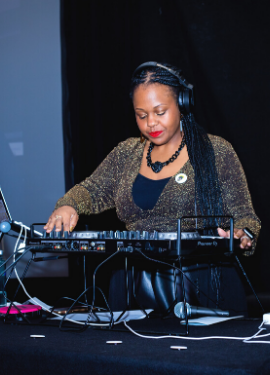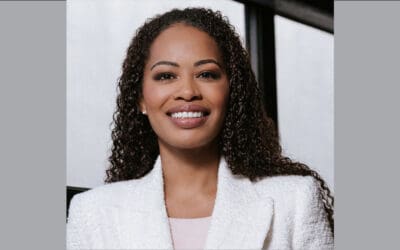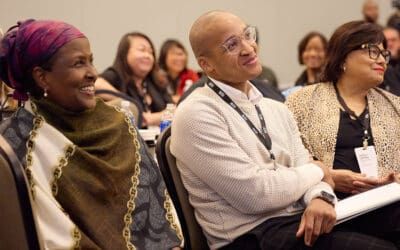Until Feb. 1, 2023, we were Group Health Foundation. This post was written under our former identity. To learn more about our new name, read our announcement here.

Carmen “Spindiego” Berkley deejaying at the National Coalition on Black Civic Participation’s National Conference. Photo credit: Sam Johnson Photography
Carmen Berkley Anderson knows that the work for health equity does not begin or end at the doctor’s office. During her senior year in college, she got a painful headache that quickly led to emergency brain surgery. “The hospital that initially saved my life denied me adequate care for nearly three weeks resulting in permanent blindness in my left eye,” Carmen shares.
The hospital’s negligence prevented Carmen from finishing her degree on time at the University of Pittsburgh and resulted in a large amount of student loan debt. “Had I been treated fairly, had they listened to me the first time and not waited until the fourth time, all this would not have happened,” says Carmen. “This story is a central part of why I work for the liberation of Black, Indigenous, and other people of color. Our race, gender, and socioeconomic status often drive how we’re treated by society and the systems that are supposed to care for us.”
Carmen recently joined Group Health Foundation as one of two vice presidents on the program team. She brings more than 15 years of professional experience with organizations, including the United States Student Association, NAACP, and AFL-CIO. As managing director for Planned Parenthood Action Fund, Carmen led a 50-person team and managed a $50 million grants, sponsorships, and advocacy portfolio. Most recently, she served as chief strategy officer for Dancing Hearts Consulting, a nationally renowned Black women-led social and political impact firm.
“We feel honored to have been introduced to so many brilliant leaders from across the country through this search process, and we were especially thrilled when we met Carmen,” Group Health Foundation President and CEO Nichole June Maher says. “She holds deep and unique expertise in advocacy, political strategy, grantmaking, and organizational development, and will bring important expertise to our collective work at the Foundation.”
Carmen grew up as part of the Black working class in Pittsburgh, and says her family’s involvement in unions was critical to her political education. “My mother has worked for the airline industry for nearly 40 years. I’m so happy that she taught me and my sister what it means to stand up for ourselves, to stand up for our jobs and for the jobs of others,” says Carmen. “She was very political. She worked on campaigns and she participated in Black movement organizing.”
These early experiences informed Carmen’s later work when she spent more than a decade in Washington, D.C. to learn what she calls “the inside and outside strategies of the Beltway, and what it takes to shift policy at the highest level.” Additionally, through organizing for Black liberation, including as a founder of BYP100 (Black Youth Project 100), Carmen says she believes communities have the strategies to reach freedom in this lifetime.
“I really want to impress upon other folks who work in philanthropy that liberation is not a zero-sum game. It’s not: either we support the white working class or we support BIPOC communities. It’s both,” Carmen says. “What I have seen as an activist, organizer, and practitioner is that philanthropy will lean into something that looks more sanitized as opposed to something that’s actually going to get communities the freedom they want. So, I’m not interested in sitting around and being philosophical about what winning looks like. Our people already have the answers.”
This is why Carmen describes her work at the Foundation as listening and learning from people who know their work and communities best. “If you are able to listen to what people need, then that is the best way to support them. And I don’t just mean in dollars, I also mean listening to how they want to develop their own programs and adjusting the Foundation’s strategy in response.”
Carmen recently moved to the Seattle area from Hyattsville, Maryland. She also goes by DJ CarmenSpindiego. “It’s the thing that I do that has everything and nothing to do with work. And I say that because music is a great equalizer,” she says. She has deejayed in a variety of venues from basement clubs to a U.S. presidential forum. Her music of choice is 90s R&B and hip hop and, at times, “dropping a little Whitney Houston and mixing it in with Beyoncé.” For the right crowd, she might play some songs from the 2020s, even if more recent music is not her favorite. Once it is safe for crowds to gather in person again, Carmen says she is looking forward to getting out and finding fellow musicians in Washington State with her husband Lee Anderson.



